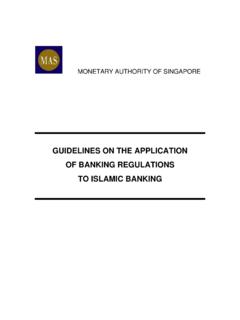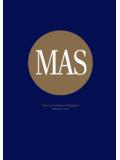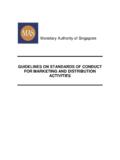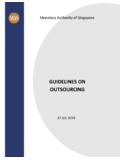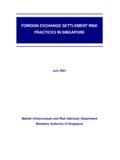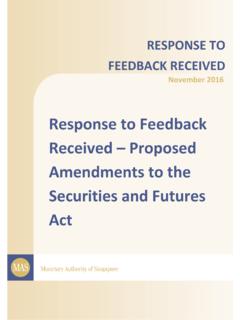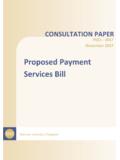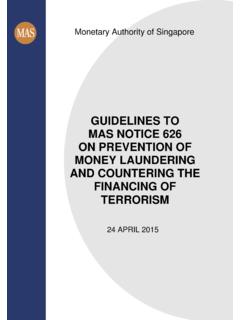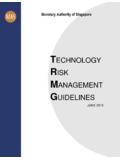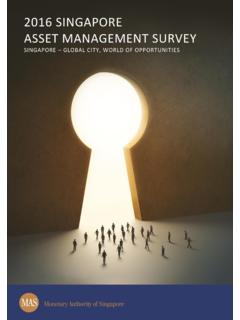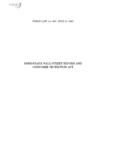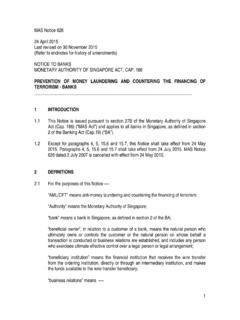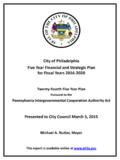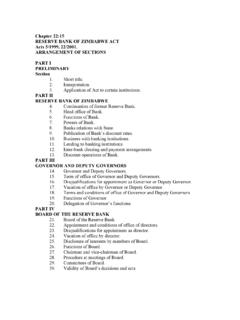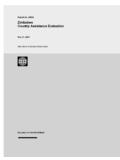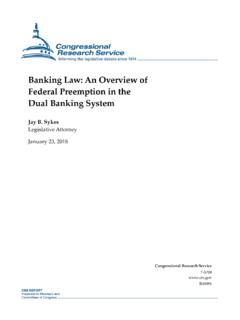Transcription of PREVENTION OF MONEY LAUNDERING AND …
1 MAS Notice 626. 24 April 2015. NOTICE TO BANKS. MONETARY AUTHORITY OF SINGAPORE ACT, CAP. 186. PREVENTION OF MONEY LAUNDERING AND COUNTERING THE FINANCING OF. TERRORISM - BANKS. _____. 1 INTRODUCTION. This Notice is issued pursuant to section 27B of the Monetary Authority of Singapore Act (Cap. 186) ( MAS Act ) and applies to all banks in Singapore, as defined in section 2 of the Banking Act ( ) ( BA ). Except for paragraphs 4, 5, and , this Notice shall take effect from 24 May 2015. Paragraphs 4, 5, and shall take effect from 24 July 2015. MAS Notice 626 dated 2 July 2007 is cancelled with effect from 24 May 2015. 2 DEFINITIONS. For the purposes of this Notice . AML/CFT means anti- MONEY LAUNDERING and countering the financing of terrorism;. Authority means the Monetary Authority of Singapore.
2 bank means a bank in Singapore, as defined in section 2 of the BA;. beneficial owner , in relation to a customer of a bank , means the natural person who ultimately owns or controls the customer or the natural person on whose behalf a transaction is conducted or business relations are established, and includes any person who exercises ultimate effective control over a legal person or legal arrangement;. beneficiary institution means the financial institution that receives the wire transfer from the ordering institution, directly or through an intermediary institution, and makes the funds available to the wire transfer beneficiary;. business relations means . (a) the opening or maintenance of an account by the bank in the name of; or 1. (b) the provision of financial advice by the bank to, a person (whether a natural person, legal person or legal arrangement).
3 CDD measures or customer due diligence measures means the measures required by paragraph 6;. CDSA means the Corruption, Drug Trafficking and Other Serious Crimes (Confiscation of Benefits) Act (Cap. 65A);. connected party . (a) in relation to a legal person (other than a partnership), means any director or any natural person having executive authority in the legal person;. (b) in relation to a legal person that is a partnership, means any partner or manager1; and (c) in relation to a legal arrangement, means any natural person having executive authority in the legal arrangement;. Core Principles refers to the Core Principles for Effective Banking Supervision issued by the Basel Committee on Banking Supervision, the Objectives and Principles for Securities Regulation issued by the International Organisation of Securities Commissions, or the Insurance Core Principles issued by the International Association of Insurance Supervisors.
4 Cross-border wire transfer means a wire transfer where the ordering institution and the beneficiary institution are located in different countries or jurisdictions and also refers to any chain of wire transfer in which at least one of the financial institutions involved is located in a different country or jurisdiction;. customer , in relation to a bank , means a person (whether a natural person, legal person or legal arrangement) . (a) with whom the bank establishes or intends to establish business relations; or (b) for whom the bank undertakes or intends to undertake any transaction without an account being opened;. domestic wire transfer means a wire transfer where the ordering institution and beneficiary institution are located in the same country or jurisdiction and also refers to any chain of wire transfer that takes place entirely within a country, even though the system used to transfer the payment message may be located in another country or 1.
5 In the case of a limited liability partnership or a limited partnership. 2. jurisdiction;. FATF means the financial Action Task Force;. financial advice means a financial advisory service as defined in section 2(1) of the financial Advisers Act (Cap. 110) or advising on corporate finance as defined in section 2(1) of the Securities and Futures Act (Cap. 289);. financial group means a group that consists of a legal person or legal arrangement exercising control and coordinating functions over the rest of the group for the application of group supervision under the Core Principles, and its branches and subsidiaries that are financial institutions as defined in section 27A(6) of the MAS Act or the equivalent financial institutions outside Singapore.
6 Government entity means a government of a country or jurisdiction, a ministry within such a government, or an agency specially established by such a government through written law;. legal arrangement means a trust or other similar arrangement;. legal person means an entity other than a natural person that can establish a permanent customer relationship with a financial institution or otherwise own property;. officer means any director or any member of the committee of management of the bank ;. ordering institution means the financial institution that initiates the wire transfer and transfers the funds upon receiving the request for a wire transfer on behalf of the wire transfer originator;. partnership means a partnership, a limited partnership within the meaning of the Limited Partnerships Act (Cap.)
7 163B) or a limited liability partnership within the meaning of the Limited Liability Partnerships Act (Cap. 163A);. personal data has the same meaning as defined in section 2(1) of the Personal Data Protection Act 2012 (Act 26 of 2012);. reasonable measures means appropriate measures which are commensurate with the MONEY LAUNDERING or terrorism financing risks;. STR means suspicious transaction report;. STRO means the Suspicious Transaction Reporting Office, Commercial Affairs Department of the Singapore Police Force;. TSOFA means the Terrorism (Suppression of Financing) Act (Cap. 325); and 3. wire transfer refers to any transaction carried out on behalf of a wire transfer originator through a financial institution by electronic means with a view to making an amount of funds available to a beneficiary person at a beneficiary institution, irrespective of whether the originator and the beneficiary are the same person.
8 A reference to any threshold or value limit expressed in S$ shall include a reference to the equivalent amount expressed in any other currency. The expressions used in this Notice shall, except where defined in this Notice or where the context otherwise requires, have the same meanings as in the BA. 3 UNDERLYING PRINCIPLES. This Notice is based on the following principles, which shall serve as a guide for all banks in the conduct of their operations and business activities: (a) A bank shall exercise due diligence when dealing with customers, natural persons appointed to act on the customer's behalf, connected parties of the customer and beneficial owners of the customer. (b) A bank shall conduct its business in conformity with high ethical standards, and guard against establishing any business relations or undertaking any transaction, that is or may be connected with or may facilitate MONEY LAUNDERING or terrorism financing.
9 (c) A bank shall, to the fullest extent possible, assist and cooperate with the relevant law enforcement authorities in Singapore to prevent MONEY LAUNDERING and terrorism financing. 4 ASSESSING RISKS AND APPLYING A RISK-BASED APPROACH. Risk Assessment A bank shall take appropriate steps to identify, assess and understand, its MONEY LAUNDERING and terrorism financing risks in relation to . (a) its customers;. (b) the countries or jurisdictions its customers are from or in;. (c) the countries or jurisdictions the bank has operations in; and (d) the products, services, transactions and delivery channels of the bank . 4. The appropriate steps referred to in paragraph shall include . (a) documenting the bank 's risk assessments;. (b) considering all the relevant risk factors before determining the level of overall risk and the appropriate type and extent of mitigation to be applied.
10 (c) keeping the bank 's risk assessments up-to-date; and (d) having appropriate mechanisms to provide its risk assessment information to the Authority. Risk Mitigation A bank shall . (a) develop and implement policies, procedures and controls, which are approved by senior management, to enable the bank to effectively manage and mitigate the risks that have been identified by the bank or notified to it by the Authority or other relevant authorities in Singapore;. (b) monitor the implementation of those policies, procedures and controls, and enhance them if necessary;. (c) perform enhanced measures where higher risks are identified, to effectively manage and mitigate those higher risks; and (d) ensure that the performance of measures or enhanced measures to effectively manage and mitigate the identified risks address the risk assessment and guidance from the Authority or other relevant authorities in Singapore.
